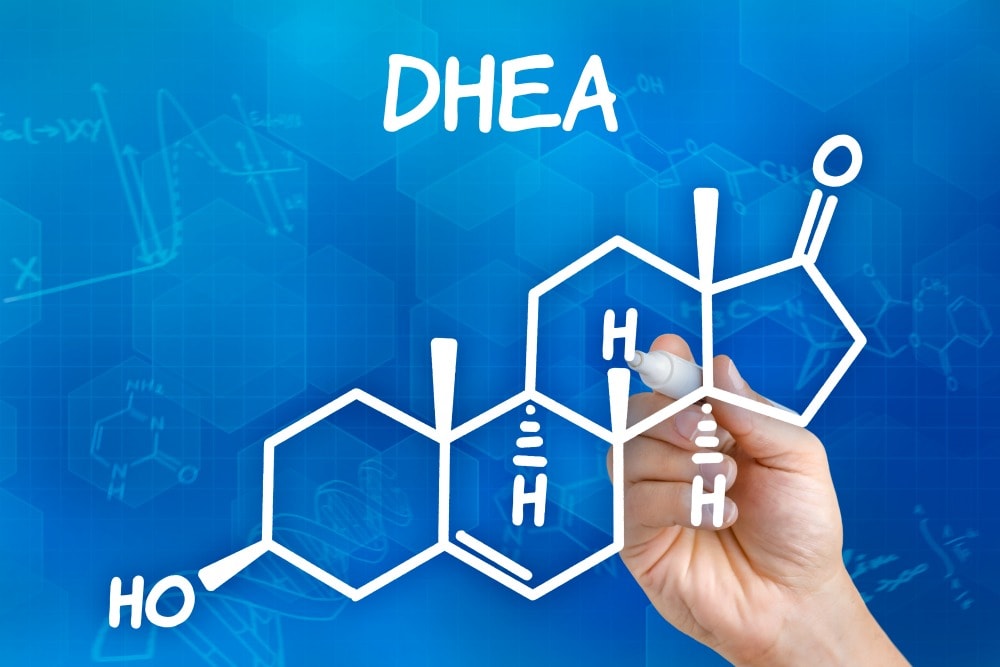The body uses DHEA to make male and female hormones.
DHEA is the precursor of testosterone, estrogen and corticosteroids.
Most of the body’s DHEA is produced in the adrenal glands and some in the brain and the skin.
DHEA is a hormone that declines with age, so when given orally it is considered to be a very powerful anti-aging hormone.
In fact, there are many studies on how DHEA is the biological condition of youth.
Whether or not this is true, DHEA is definitely a hormone that has significant effects on the body when its levels are low.
Deficiency Is Linked to Many Health Problems
Research tells us that low levels of DHEA are found in many cases of:
- Cancers
- Cardiovascular disease
- Alzheimer’s
- Diabetes
- Depression
- Hypothyroidism
- Menopause
- Reduced memory and cognition
- Dry eyes
- Infertility
- Osteoporosis
- Low libido
- Aging skin
- Adrenal fatigue
The Role of Chronic Stress
One important connection among many of these conditions is the link between DHEA and cortisol levels.
Chronic stress can lead to chronically high levels of cortisol which eventually leads to hormonal imbalances and the gradual decline of DHEA levels.
By increasing DHEA levels, high levels of cortisol are reduced.
Chronically high stress and cortisol levels over time lead to:
- Impaired functioning of the immune system
- Hardening of the arteries
- Thinning bones
- Very severe depression
- Impaired memory
- Impaired reaction time
- Impaired learning ability
Consequently, it is no surprise that children on the autism spectrum and those with other neurodevelopmental and behavioral disorders have also been found to have low levels of DHEA.
Adrenal stress is a very common factor for children with neurodevelopmental and learning disorders; some of these children may in fact have adrenal exhaustion.
When a child is chronically stressed, his or her body is sympathetic-nervous-system dominant which means the body is in a “fight or flight” mode.
The stress hormones – adrenaline, cortisol and DHEA – are then released causing the body to react immediately, and if the heightened stress continues, then this will eventually lead to adrenal stress.
The reality is that adrenal fatigue affects every organ and system in the body.
When the adrenal glands are unable to meet the demands of physical, emotional, psychological or biochemical stress, then hormones like DHEA will stop producing and will no longer protect the body.
Important Functions
DHEA boosts immune functioning by protecting the thymus gland.
In order for the immune system to be healthy and function appropriately, DHEA and cortisol levels must be balanced in the blood.
Another important function is that DHEA protects against chronic stress by preventing the destruction of tryptophan which converts to 5HTP; both are precursors to serotonin.
Serotonin provides protection against chronic stress and keeps the body calm.
If testing is not an option, here are some symptoms to look for in your child that indicate adrenal stress and possible low DHEA and high cortisol levels:
- Obsessive Compulsive Disorder (OCD)
- Dizziness / light headedness when standing
- Sensitivities to odors
- Eating preferences and food rejection
- Short attention span
- Doesn’t respond when spoken to
- Transition issues when accepting new tasks
- Avoids eye contact, bright lights and certain colors
- Sensory issues: Doesn’t like messy play and getting dirty
- Salt cravings: Adrenal glands require high levels of sodium and other minerals
- Sugar cravings: Adrenal hormones stimulate the liver to produce glucose which upsets the blood sugar balance in the blood system
- Increased heart rate at rest
- Increased allergies to food and environment: Elevated cortisol will increase an allergic immune response
- Chemical sensitivities
- Excessive sweating
- Dilated pupils
- Frequent illnesses, swollen lymph glands and slow recovery from illnesses: Stress reduces the production of secretory IgA, the first line of defense
- Difficulty falling asleep and waking up
- Digestive disorders such as diarrhea or constipation: Elevated stress draws blood away from the bowels
- Heightened sensitivities to stimuli, hyperactivity, repetitive and self-stimulatory behaviors
- Poor skin condition such as stretch marks or other skin issues
Still Looking for Answers?
Visit the Epidemic Answers Practitioner Directory to find a practitioner near you.
Join us inside our online membership community for parents, Healing Together, where you’ll find even more healing resources, expert guidance, and a community to support you every step of your child’s healing journey.
Sources & References
No sources & references currently available.
Resources
No resources currently available.
Related Pages
No related pages currently available.
